All About White Peppercorns
White pepper isn’t just the pale cousin of black pepper—it’s a bold, underrated spice that deserves a spot front and center in your kitchen. While it might look subtle, this spice packs a punch with a sharp, earthy heat and a mysterious depth that transforms everything from creamy soups to stir-fries. In this post, I’m diving deep into the world of white pepper: where it comes from, how it’s made, and why it can make or break a dish.
You might think pepper is pepper—but think again. White pepper has a completely different personality from black pepper, and knowing how to use it can unlock a whole new level of flavor. Whether you’re chasing that signature heat in Chinese hot and sour soup or perfecting a silky béchamel, white pepper brings elegance and edge in equal measure.
Get ready to rethink everything you thought you knew about seasoning. I’ll show you how to choose the right white pepper, when to reach for it instead of black, and a few unexpected ways to let it shine. If you’ve ever overlooked that pale powder in your spice rack, now’s the time to give it the attention it deserves. Let’s turn up the heat—quietly, but powerfully.
So what is all the fuss about? Is there really a huge difference between white and black pepper?
Yes, there is a real difference between white and black pepper, even though they come from the same plant.
The fuss all comes down to how they’re processed. Black pepper is made by harvesting unripe pepper berries and drying them with the outer skin intact, which gives it that familiar wrinkly black coat and sharp, biting flavor.
White pepper, on the other hand, is made from fully ripe berries with the outer layer removed before they are dried. What’s left is the inner seed—smoother in texture, milder in aroma, but still packing heat with a slightly fermented, earthy kick.
The difference is most evident in cooking. White pepper is often chosen for its ability to disappear visually into light-colored dishes like cream sauces, mashed potatoes, or fish soups—places where black specks would stand out. But beyond looks, white pepper brings a muskier, more complex flavor that works beautifully in Asian, French, and Scandinavian cuisines.
Yes, there is a significant difference—not just in color, but also in taste, aroma, and application. It’s not about one being better than the other—it’s about knowing when each one shines. And once you taste the subtle power of white pepper in the right dish, you’ll get the fuss.
What does white pepper taste like?
It is a little bit hot, a little bit winey, and a lot earthy. The key distinction between white and black pepper is white pepper’s earthiness. In dishes where I want to highlight earthiness, I use white pepper. I use black pepper in dishes where I am just looking for a base note of heat.
Some cuisines lend themselves more naturally to one over the other. For example, white pepper is widely used in Indian, Asian, and Mexican cuisines. To me, the food from these regions is very earthy and highly spiced.
I don’t necessarily mean “hot,” well-spiced. Although I often use white pepper in white sauces, I use it more for the flavor than the aesthetics. I also love to pair white pepper with cumin, another of my favorite earthy spices.
While you can purchase ground white pepper, I recommend buying whole white peppercorns as the flavor will last much longer. Black and white pepper begin to lose potency upon grinding, so grinding fresh right before using will give the best flavor.
Occasionally, I have seen whole white peppercorns at the grocery store, but they are usually very expensive and can be difficult to find. I recommend buying them in bulk at Amazon.com, where you will find a large selection. See White Peppercorns.
White Pepper FAQ
How does white pepper’s flavor change when it’s freshly ground vs. pre-ground?
Freshly ground has a sharper, more vibrant heat; pre-ground can taste dull or musty.
What types of dishes benefit most from white pepper’s unique flavor?
Creamy sauces, light soups, mashed potatoes, and Asian stir-fries.
When should I use white pepper instead of black pepper?
Use it when you want heat without visible specks or when you want a deeper, earthy flavor.
Does white pepper lose its potency faster than black pepper?
Yes—especially ground white pepper. Whole peppercorns last longer.
At what stage in cooking should I add white pepper?
Add it toward the end for the brightest flavor, unless the recipe says otherwise.
Can I substitute white pepper for black—and what changes?
Yes, but expect a muskier, more fermented note and less floral sharpness.
Why is white pepper used in Chinese and French cuisines?
It blends into pale sauces and soups while adding warmth and complexity.
How is white pepper processed differently from black?
The outer skin is removed after soaking ripe berries—leaving just the inner seed.
Where does the best white pepper come from?
Top producers include Sarawak (Malaysia), Indonesia, and Vietnam.
Is the fermentation process responsible for its aroma?
Yes—that earthy, slightly funky scent comes from the soaking and drying steps.
What should I look for when buying high-quality white pepper?
Whole, uniform peppercorns with a clean, strong aroma and minimal discoloration.
How should I store white pepper?
Keep it in an airtight container away from heat, light, and moisture—especially if ground.

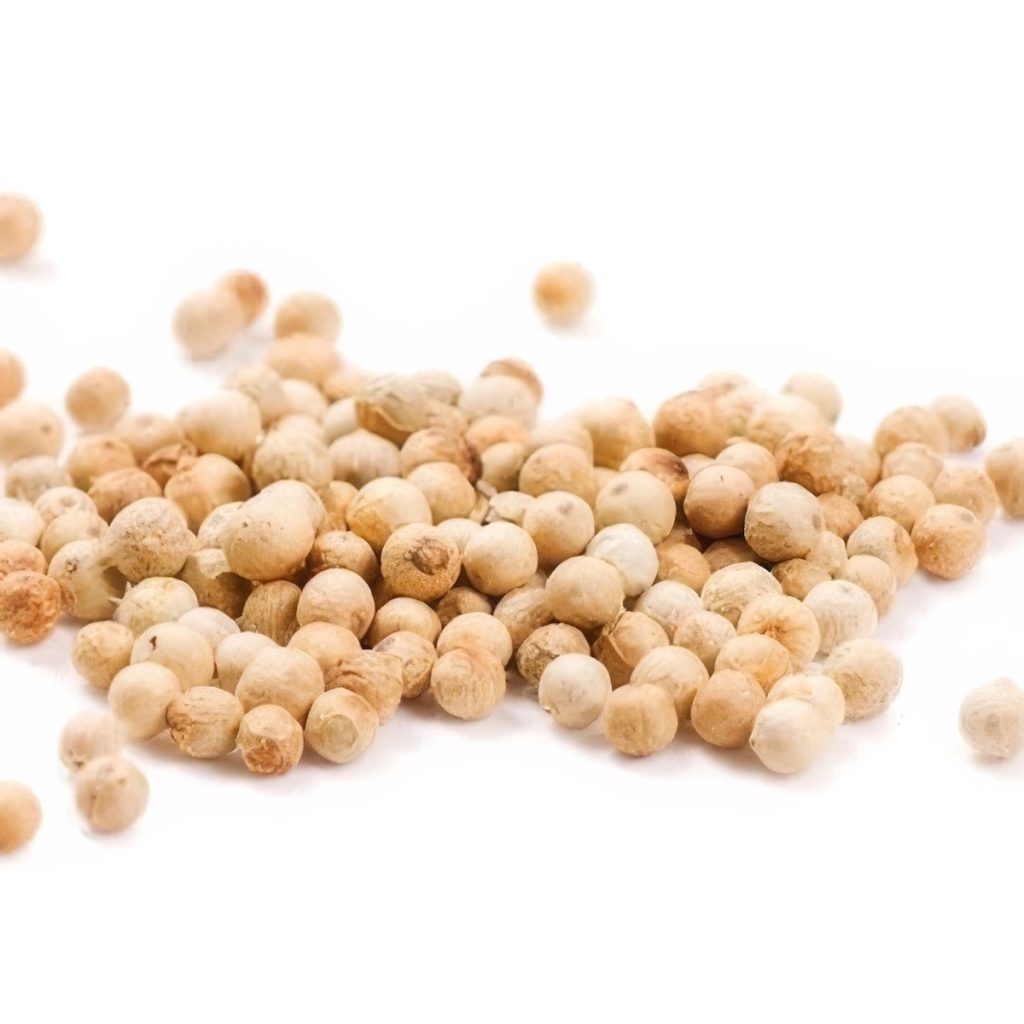
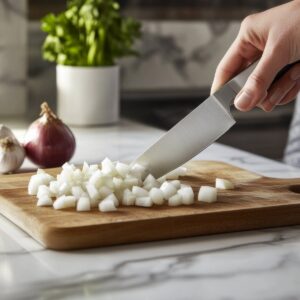
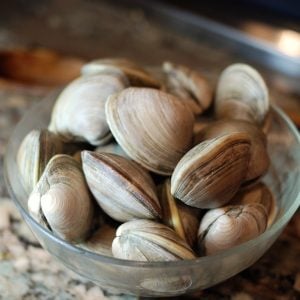


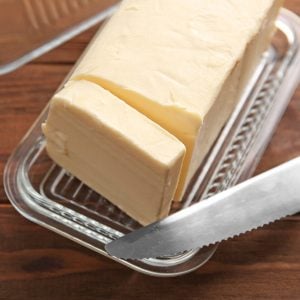


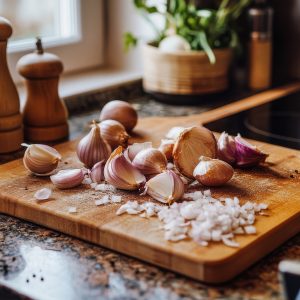



25 Responses
That is really interesting information. I had a discussion with my husband on the subject of what/where white pepper comes from & and now we have the answer. Thank you
The word “earthy” sounds pleasant. But white pepper makes me immediately feel like I’m in an elephant cage. I wonder if I’m more sensitive to some compounds in white pepper.
Interesting!
when I think of earthly I think of beets. I love them but they seem to have the taste of earth when I eat them. Like Stef says, I like green to yellow banannas much better and when they are yellow to brown way to sweet for me
I love white pepper, I agree that it has a more complex flavor than black and is also a bit spicier but in an oddly subtle way. I often use it instead of black in many recipes. I never really thought of it as being earthier, but that’s a good description. Good info.
Thanks for the info and especially the reference to flavour/use..
I’m having trouble with my diet, my Dr. said no black pepper.that it don’t digest. I’m on a slow digest diet. I was trying to find out if White pepper dissolved. On my list, my avoid list is twice as long as the allowed side. I’m trying to be creative.If you could let me know about white pepper. Thank you. Becky
Hi Becky, I think you need to speak with a nutritionist and/or ask your doctor about white pepper.
My Grandson is highly allergic to white pepper…and not to black pepper
Restaurants should post ingredients in their recipes. We always have to ask
at any restaurant if they use white pepper.
My Grandson is highly allergic to white pepper
that is surprising because both black pepper and white pepper are same botanical plant: Piper nigrum. White pepper are fruits that are allowed to fully ripen on living plants before picking. After picking outer layer is removed either by a mechanical process or by soaking in water and let outer skin rot and easy to remove. Former process of using only mechanical method ought not change chemical composition but still small amount of skin matter may still be there. So it is the skin which your grandson is allergic to. Alternatively it could be that rotting method was used and it changes chemical composition.
Sometimes in white pepper processing, hydrogen peroxide is used to ‘polish’ white pepper and give it a clean creamy look. Additionally, it acts as an anti-bacterial. I wonder if your grandson is allergic to hydrogen peroxide.
Agreed.
Not to be an armchair physician but being allergic to one and not the other sounds like a misdiagnosis. Ask your allergy specialist what it is about black vs white that is different. Some people just say they are allergic to things they don’t like. White pepper is the seed heart. Black pepper is the seed heart PLUS THE SKIN OF THE SEED! So you are getting LESS of plant in white pepper, so it makes no sense to be allergic to the seed heart ONLY, when you are eating that same heart in black pepper.
Only the preparation method might be the answer. How they extract the seed heart. Only use white pepper extracted using pure water.
From an article:
“Something important to note is that if you are allergic to black pepper, then you will more than likely be allergic to white and green pepper corns in the same forms. This is because black, white, and green peppercorns comes from the same fruit (seed pod) in different stages of growth and processing.” Full article here: http://www.onegreenplanet.org/natural-health/symptoms-you-may-be-allergic-to-black-pepper/
Consider that this could also have to do with the whole difference in ripening duration.
Certain chemicals could be further developed or concentrated during the ripening process.
I am able to eat black pepper. It will tingle a bit but that’s it.
White pepper will cause my tastebuds and my mouth to swell, itch, and the skin to crack.
I found this to be very interesting. Mostly because I ran out of my tellicherry peppercorns and had some back up white ground pepper someone had given me and used it in my food last night and this morning. I thought for sure I was crazy last night because I kept getting a flavour that reminded me somewhat of BBQ. However, as I like flavour complexity and had enough other things going on in my sautee I didn’t hate it as much as most BBQ-esque things.
This morning was another story. Again, still out of pepper (going to get some tonight) and so I used a couple liberal pinches of the white stuff I had on my toast with avocado, tomato and egg. Yep. Do not really like it. I get why people would pair it with cumin, because I can taste subtly the similarities, but again too something for me.
Reading about the fact that it was a fully ripened and skinned pepper (if you will) piqued my interest. I don’t like overly ripe fruit for example, it has to be kind of just getting there typically (especially for banana), something about the tartness. I also really like bold flavours and things most people find to be bitter. Now I’m just curious if I don’t like anything that’s ripened with the exception of cheese.
Thanks for the interesting read.
This is a great article. I always ask customers which one they prefer, and the results obviously vary, but the most popular choice is white.
I used white pepper today because I didn’t have black. I used it in my chicken noodle soup. It had no oomph. It did leave a feel in my mouth but I wouldn’t say heat. I also do not detect subtle flavor instead it almost annoyed me kinda tasted pepper but not really. I hadn’t thought about using for the color difference it after tasting it in my soup id say it’s flavorless by comparison. I’ll try it in more dishes and see but overall I’m not impressed.
Tink, my only question would be how long have you had the white pepper stored in your cabinet? All peppers will lose some of their heat over time so if your white pepper has been sitting there for years, it may be why it has lost its spiciness. Saying that, I just looked up the difference between white and black pepper and found Cooks Illustrated saying, “LESS HEAT, MORE COMPLEXITY: White pepper has a different flavor profile than black. Only substitute black pepper if the amount called for is small.”
Because of battles of kidney stones, I have been put on a low oxalate diet and told to stay away from black pepper to substitute white pepper instead. Any thoughts ?
Hey Chuck, I think it best you consult with your doctor or a nutritionist for an answer to this question.
We live in a region of the world Amazon doesn’t deliver to, and our local grocery sadly does not have whole white peppercorns — just ground.
I brought most of the ingredients with me from America for from-scratch Thai green curry paste, but I foolishly thought, “I’m sure I can find white peppercorns over there.”
So now I’m going to have to substitute ground for whole. I’m wondering, what is the ground white pepper equivalent of a tablespoon of whole white peppercorns, for a similar spice level?
None of the other top Google results have this equivalence… They have other ground-to-whole equivalences, but whole white peppercorns are a bit too rare to have on the popular lists.
Thanks in advance!
Andrew, not sure if this helps but I found a site that describes 4 tablespoons of whole white peppercorns (1 oz) is equivalent to 3.88 tablespoons (1 oz.) ground.
Nice post. Thank you so much for the share. This is really very well and informative content.
I too am very allergic\intolerant to White Pepper but not black. In regards to this questioning the validity of actually being allergic, I had an ELISA food intolerance test done. This test takes your blood and tests it against 500 or so foods and chemicals. My blood reacted to white pepper as well as several others. I’ve proved its true about 15 times in the last 17 years since that test, and I definitely react terribly to white pepper as I found out after having colitis attacks that white pepper was a hidden ingredient. It’s not an anaphylaxis type reaction, but still quite severe which will cost me a day of being down very sick. I know this is a few years behind the other comments, but still wanted to provide my experience as well.
Very helpful article mate. As you mentioned there is always debate in between chefs over which peppercorn to use. I personally prefer to use White peppercorns due to the earthy taste.
Cheers!
I too taste elephant cage in white pepper…..